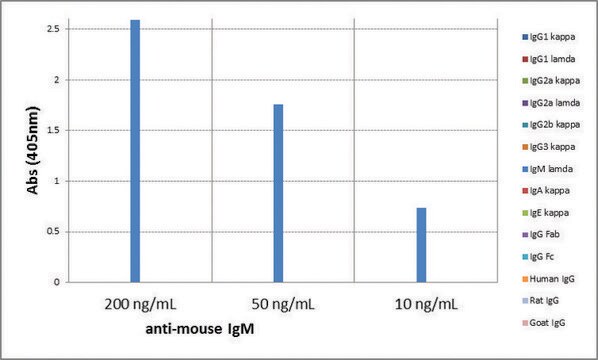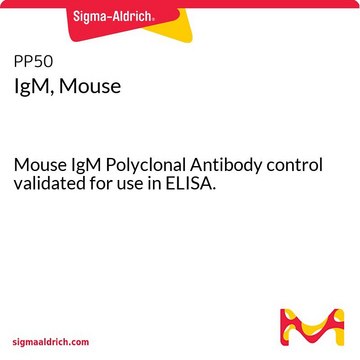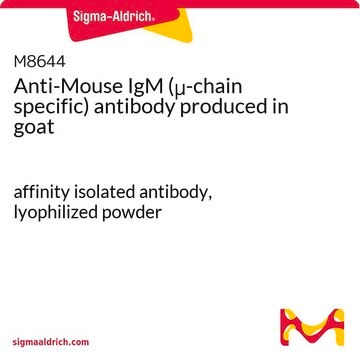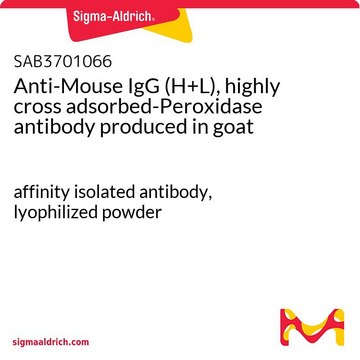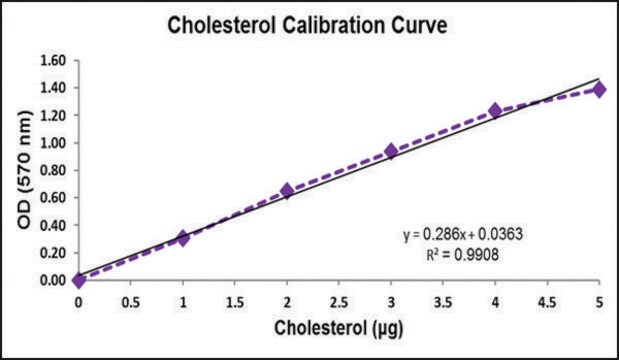MABC008
Mouse IgM Negative Control, clone GC323
Mouse IgM Negative Control Monoclonal Antibody validated for use in Flow Cytometry & Immunofluorescence.
Iniciar sesiónpara Ver la Fijación de precios por contrato y de la organización
About This Item
Código UNSPSC:
12352203
eCl@ss:
32160702
NACRES:
NA.42
Productos recomendados
origen biológico
mouse
Nivel de calidad
clon
GC323, monoclonal
fabricante / nombre comercial
Chemicon®
concentración
0.5 mg/mL
técnicas
flow cytometry: suitable
immunofluorescence: suitable
isotipo
IgM
Condiciones de envío
wet ice
modificación del objetivo postraduccional
unmodified
Especificidad
This antibody reacts specifically with the outer membrane protein I component of various strains of Neisseria gonorrhoeae and does not react with any human cell surface component.
Inmunógeno
Protein I preparation of Neisseria gonorrhoeae.
Aplicación
Research Category
Secondary & Control Antibodies
Epitope Tags & General Use
Secondary & Control Antibodies
Epitope Tags & General Use
Research Sub Category
Isotype Control Antibodies
Isotype Control Antibodies
The use of this antibody enables an estimation of non-specific binding of mouse monoclonal antibodies of isotype IgM to cell surface components in human blood and bone marrow. It is not suitable for use in immunohistochemical procedures.
SUGGESTED USAGE
The control antibody should be diluted to the same concentration as the test antibody, and equivalent volumes used. Flow cytometry and immunofluorescence - use 10 μl direct from the vial per 100 μl of whole blood, or 1 x 10E6 peripheral blood mononuclear cells (PBMC) in 100 μl buffer.
SUGGESTED USAGE
The control antibody should be diluted to the same concentration as the test antibody, and equivalent volumes used. Flow cytometry and immunofluorescence - use 10 μl direct from the vial per 100 μl of whole blood, or 1 x 10E6 peripheral blood mononuclear cells (PBMC) in 100 μl buffer.
Forma física
Format: Purified
Purified from mouse ascitic fluid. The antibody is supplied in 0.5ml 25mM Tris HCl, 0.4M NaCl, pH 8.0, containing 0.2% bovine serum albumin and 0.1% sodium azide. The characteristics of each lot are tested by electrophoresis, specific immunofluorescence assay and flow cytometry.
Almacenamiento y estabilidad
Store at 2 to 8°C, for up to 6 months. For prolonged periods, store below -20°C in undiluted aliquots. AVOID REPEATED FREEZE/THAW CYCLES.
WARNING: The monoclonal reagent solution contains 0.1% sodium azide as a preservative. Due to potential hazards arising from the build up of this material in pipes, spent reagent should be disposed of with liberal volumes of water.
WARNING: The monoclonal reagent solution contains 0.1% sodium azide as a preservative. Due to potential hazards arising from the build up of this material in pipes, spent reagent should be disposed of with liberal volumes of water.
Información legal
CHEMICON is a registered trademark of Merck KGaA, Darmstadt, Germany
Cláusula de descargo de responsabilidad
Unless otherwise stated in our catalog or other company documentation accompanying the product(s), our products are intended for research use only and are not to be used for any other purpose, which includes but is not limited to, unauthorized commercial uses, in vitro diagnostic uses, ex vivo or in vivo therapeutic uses or any type of consumption or application to humans or animals.
Palabra de señalización
Warning
Frases de peligro
Consejos de prudencia
Clasificaciones de peligro
Met. Corr. 1
Código de clase de almacenamiento
8B - Non-combustible corrosive hazardous materials
Clase de riesgo para el agua (WGK)
WGK 2
Punto de inflamabilidad (°F)
Not applicable
Punto de inflamabilidad (°C)
Not applicable
Certificados de análisis (COA)
Busque Certificados de análisis (COA) introduciendo el número de lote del producto. Los números de lote se encuentran en la etiqueta del producto después de las palabras «Lot» o «Batch»
¿Ya tiene este producto?
Encuentre la documentación para los productos que ha comprado recientemente en la Biblioteca de documentos.
Acceptance of embryonic stem cells by a wide developmental range of mouse tetraploid embryos.
Lin, CJ; Amano, T; Zhang, J; Chen, YE; Tian, XC
Biology of Reproduction null
Chih-Jen Lin et al.
PloS one, 9(9), e106916-e106916 (2014-09-12)
The ability of small molecules to maintain self-renewal and to inhibit differentiation of pluripotent stem cells has been well-demonstrated. Two widely used molecules are PD 98059 (PD), an inhibitor of extracellular-signal-regulated kinase 1 (ERK), and SC1 (Pluripotin), which inhibits the
Nuestro equipo de científicos tiene experiencia en todas las áreas de investigación: Ciencias de la vida, Ciencia de los materiales, Síntesis química, Cromatografía, Analítica y muchas otras.
Póngase en contacto con el Servicio técnico